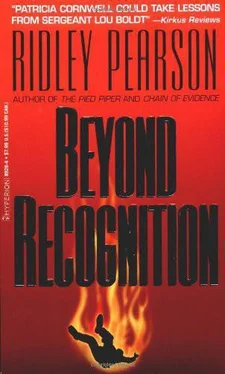Ridley Pearson - Beyond Recognition
Здесь есть возможность читать онлайн «Ridley Pearson - Beyond Recognition» весь текст электронной книги совершенно бесплатно (целиком полную версию без сокращений). В некоторых случаях можно слушать аудио, скачать через торрент в формате fb2 и присутствует краткое содержание. Жанр: Триллер, на английском языке. Описание произведения, (предисловие) а так же отзывы посетителей доступны на портале библиотеки ЛибКат.
- Название:Beyond Recognition
- Автор:
- Жанр:
- Год:неизвестен
- ISBN:нет данных
- Рейтинг книги:5 / 5. Голосов: 1
-
Избранное:Добавить в избранное
- Отзывы:
-
Ваша оценка:
- 100
- 1
- 2
- 3
- 4
- 5
Beyond Recognition: краткое содержание, описание и аннотация
Предлагаем к чтению аннотацию, описание, краткое содержание или предисловие (зависит от того, что написал сам автор книги «Beyond Recognition»). Если вы не нашли необходимую информацию о книге — напишите в комментариях, мы постараемся отыскать её.
Beyond Recognition — читать онлайн бесплатно полную книгу (весь текст) целиком
Ниже представлен текст книги, разбитый по страницам. Система сохранения места последней прочитанной страницы, позволяет с удобством читать онлайн бесплатно книгу «Beyond Recognition», без необходимости каждый раз заново искать на чём Вы остановились. Поставьте закладку, и сможете в любой момент перейти на страницу, на которой закончили чтение.
Интервал:
Закладка:
He pulled to a stop, the siren running down and silenced but the light still flashing on the dash. His terror erupted as a brief sputter of laughter-it was a joke, some kind of mistake, McClure confusing one patient with another.
“They help with the pain.” Boldt pressed his hands to his ears. He didn’t want McClure’s words circulating inside his head. He didn’t want to hear his voice. He wanted peace, release. He wanted to awaken, to wash the nightmare from his face with a quick splash of cold water. “Wake me up,” he muttered.
Marina opened the door, the smile on her face running off like melted wax, replaced with a troubled look of concern. “Mr. Boldt?”
“She here?”
A shake of the head. “Work.”
Was she back at work? He couldn’t remember where he had slept last night, what day it was. “The kids?”
On cue, Miles rounded the corner, yelped, “Daddy!” and held his arms outstretched for his father, who scooped him up and then broke into tears. Marina, arms crossed as if freezing cold, stood in the entranceway, unable to take her eyes off Boldt and his tears. She gasped, “Everything okay?”
Miles cuddled himself around Boldt’s neck, clinging tightly. The father’s eyes met those of the woman, and she sobered. “I’m right here,” the woman told Boldt. He passed Miles back to her and nodded, the tears dripping from his chin. He felt embarrassed, exhausted, terrified. He didn’t want a world without Liz; he didn’t want to think of her in pain. He wanted to take her away, as if by leaving she might leave the illness behind as well.
His car flew down the road, driven by someone else. Car horns complained behind him as he ran intersections, his vision more occupied by a stream of memories than by the road he traveled. He was a flood of regret, seeing so many chances to be a better person to her, a better husband, a better lover, a better friend. How much of illness is physical, he wondered, and how much a product of one’s environment? If he had been more available, less self-absorbed, would she even be sick? His thoughts played tricks on him: self-pity, shame, a bone-numbing fear. He pushed on the accelerator and begged to be released. “Make it not so,” he mumbled.
The office building towered over downtown, stretching for a piece of the sky that would offer a glimpse of Elliott Bay and Puget Sound beyond. It had been erected in the mid-seventies at the start of an economic boom that foreshadowed the high-tech revolution and the invasion of the Californians. Boldt parked illegally, pulled his POLICE ON DUTY sign onto the dash to keep the meter readers at bay, and hurried up the long procession of low steps that eventually rose to meet the glass and steel of the lobby.
He turned heads as he marched toward the elevators in long, defiant strides. He rode the elevator alone, which was the first decent thing to happen to him that day.
“Elizabeth Boldt,” he informed the receptionist. In all the years of his wife’s working here, Boldt had visited the offices only a handful of times. He realized then that he brought his work home almost every night, whereas Liz did so only occasionally. She earned nearly four times his pay and had pleaded with him regularly to give up the badge-or, at a bare minimum, the field work-in part because she couldn’t stand the tension resulting from the danger involved. The two years in which he had taken a leave of absence for the arrival and care of Miles had been among their most happy. He’d been seduced back into public service, in part by a bizarre case involving the theft of human organs, in part by the ways and means of Daphne Matthews. But looking back while he awaited the receptionist to notify his wife of his arrival, Boldt thought the return to service a mistake. They had found each other again during those two years, Boldt with late-afternoon happy hour piano gigs, Liz with a husband who wasn’t mentally and emotionally preoccupied by his work.
“She’s in a meeting. It’ll be a few minutes.” The woman pointed to the waiting area’s three couches. “Can I get you some coffee?”
“No, it’ll be now,” Boldt told her. “I’m her husband. It can’t wait. Where’s the meeting?”
The woman said kindly, “I’m sorry, sir-”
“Jenny,” Boldt said, naming Liz’s assistant. “I need to talk to Jenny.” He didn’t wait for this woman’s approval, but instead charged off with his heavy strides in the direction of Liz’s office. As it happened, he passed a conference room immediately, voices chattering inside. He swung open the door without knocking, looked around, and did not see her. “Elizabeth Boldt,” he told the gawking faces. They shook their heads nearly in unison, but one of the women pointed farther down the hall. “Thank you.” He pulled the door shut quietly.
Jenny was already heading toward him at a run. The two were phone pals but rarely met face-to-face. “Lou?” she called out in a voice of alarm. She apparently knew him well enough to recognize disaster on his face, or perhaps-he thought-it wasn’t so difficult to see. “It’s not one of the kids, is it?”
“Where is she?”
“A meeting.”
“I need to see her now!”
“It’s with the president and the chairman. It shouldn’t run much longer.”
“I don’t care who it’s with,” he snapped. “Now!” he shouted loudly. Looking directly into her brown eyes, he said, “I will make a scene you won’t believe, Jenny. Now! Right now. No matter how important that meeting. Is that clear?”
His pager sounded. Jenny looked down at his waist. Boldt moved his jacket aside and looked at the device as well. It seemed attached to a different man, someone else. He glanced down the hall to the corner turn that led to the “hallway of power,” as Liz called it. She was down there in one of those rooms. The pager had a sobering effect on him. He switched it off. There he was, once again faced with his job versus his relationship, and despite all the reasoning, all the regret of the last hour, it wasn’t as simple as dropping the pager into the trash. The Scholar was out there preparing to kill people. He knew this to his core.
And Liz was in a meeting, and Jenny seemed prepared to put her body between Boldt and the hallway of power.
“How long?” Boldt asked her, pulling the pager off his belt and angling the LCD screen so that it was legible. It was that move that seemed in such violation of everything he had been thinking. An internal voice asked, How could you? And there was no immediate answer from the defense. He had responsibilities to his team, to the city, to the innocent, but none of that entered his mind. All he could think was that he knew he was going to call in the page, the summons, and that whatever it was would take him away from there, from her. She would remain in her boardroom and he would be back in his shitheap of a department-issue four-door, racing off to the next emergency.
He looked down at Jenny with sad eyes.
“She called the meeting, Lou,” Jenny said. “Whatever it is, it has to be important. I don’t dare interrupt it.”
Boldt nodded. “It’s important, all right,” he agreed. She had to be offering her resignation. She wanted time with the kids. He felt his throat constrict with grief. Deciding to spare this woman his bubbling and gushing, he forced out the words. “Tell her I came by. Tell her it’s important. I’m on the cellphone,” he said, pulling himself back together. Mention of the phone caused him to check it. LO BAT it read. It was dead-just like everything around him. “I don’t know,” he said to her, feeling beaten. He turned and headed back toward reception.
Jenny followed him the whole way, but she never said a word. She held the door for him and then stepped out into the hall and called an elevator for him, perhaps because he seemed incapable of even the simplest act. Boldt stepped onto the elevator. Their eyes met as the doors closed. Hers were sympathetic and troubled. His were stone-cold dead-and watery, like melting ice.
Читать дальшеИнтервал:
Закладка:
Похожие книги на «Beyond Recognition»
Представляем Вашему вниманию похожие книги на «Beyond Recognition» списком для выбора. Мы отобрали схожую по названию и смыслу литературу в надежде предоставить читателям больше вариантов отыскать новые, интересные, ещё непрочитанные произведения.
Обсуждение, отзывы о книге «Beyond Recognition» и просто собственные мнения читателей. Оставьте ваши комментарии, напишите, что Вы думаете о произведении, его смысле или главных героях. Укажите что конкретно понравилось, а что нет, и почему Вы так считаете.












